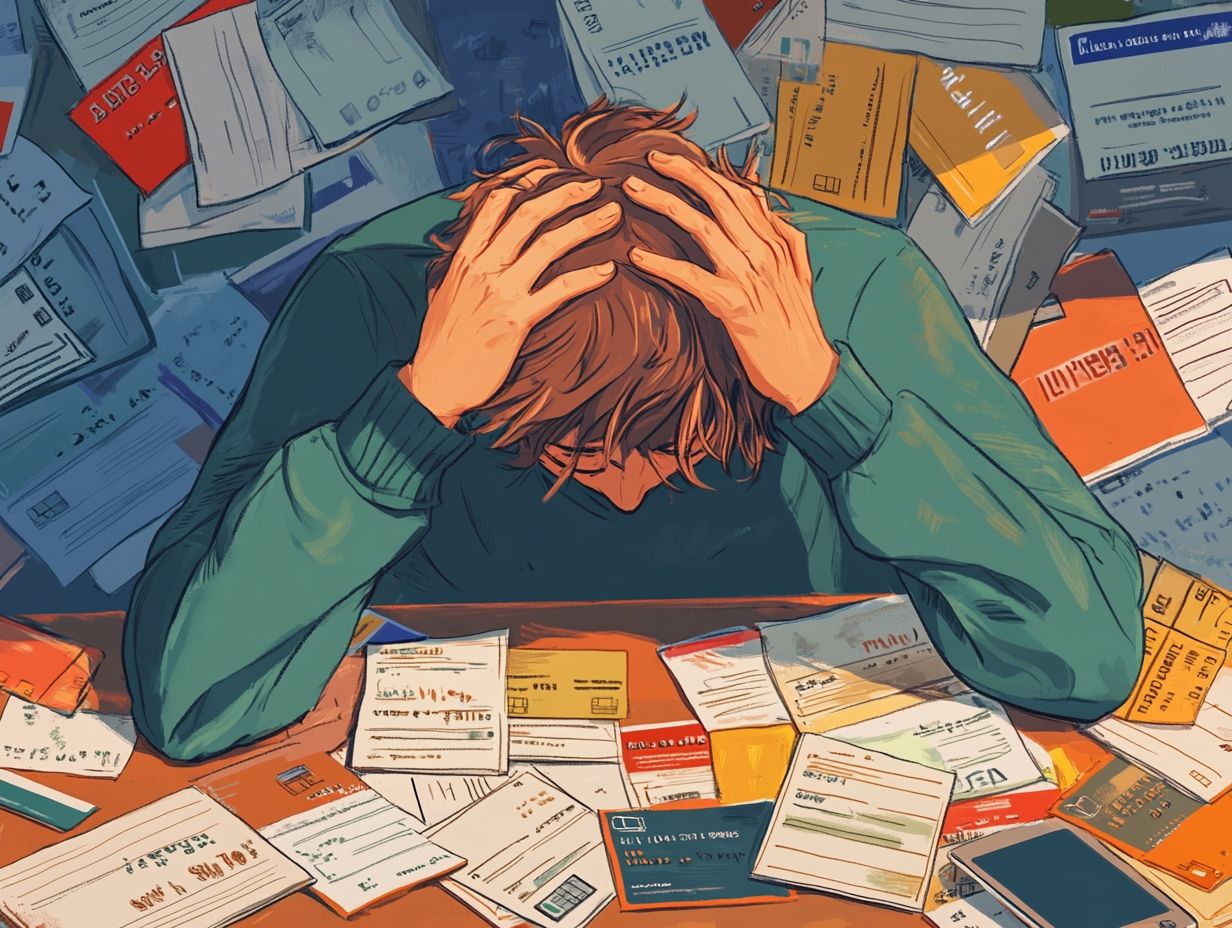5 Reasons Your Credit Card Application Might Fail
Navigating the world of credit cards can feel overwhelming. Discover the five common pitfalls that could sabotage your credit card application!
This article explores issues ranging from insufficient credit history to past bankruptcies. It outlines the minimum requirements for approval, strategies to enhance your creditworthiness, and tips to steer clear of common mistakes.
Whether you re applying for the first time or seeking to rebuild your credit, understanding these factors is essential for your financial journey.
Contents
- Key Takeaways:
- 1. Insufficient Credit History
- 2. High Ratio of Debts to Income
- 3. Low Credit Score
- 4. Inaccurate or Missing Information on Application
- 5. Previous Bankruptcy or Default
- What Are the Minimum Requirements for a Credit Card Application?
- How Can One Improve Their Chances of Being Approved for a Credit Card?
- What Are the Different Types of Credit Scores and Which Ones Do Credit Card Companies Use?
- How Can One Check and Monitor Their Credit Score?
- What Are Some Common Mistakes to Avoid When Applying for a Credit Card?
- What Are Some Alternative Options for Those Who Have Been Denied a Credit Card?
- Frequently Asked Questions
- What are the main reasons my credit card application might get rejected?
- How can a low credit score affect my credit card application?
- What is a high debt-to-income ratio and why does it matter?
- Why is my income important for a credit card application?
- Can recent delinquent accounts affect my credit card application?
- What should I do if there are errors on my credit report?
Key Takeaways:

- Having a low credit score, insufficient credit history, or a high ratio of debts to income can result in a credit card application being denied.
- It is important to provide accurate and complete information on a credit card application to increase your chances of approval.
- Past bankruptcy or default can also hurt credit card application success, so it’s important to work on improving credit before applying.
1. Insufficient Credit History
Insufficient credit history is often a key reason your credit card applications might get denied. To avoid this, it’s important to understand 5 things to know before credit card application, as lenders typically rely on credit reports to gauge your creditworthiness.
Without a solid credit profile, it can be tough to secure a credit card. This lack of access may hinder your ability to build credit.
To tackle this challenge, consider options like secured credit cards or becoming an authorized user on someone else’s account. Secured cards require a cash deposit that acts as collateral.
This makes them a viable choice for those with limited credit backgrounds. Alternatively, by becoming an authorized user, you can benefit from the primary cardholder’s credit history.
Establishing and enhancing your credit history is crucial. A strong track record can unlock better financial opportunities and lead to greater financial freedom.
2. High Ratio of Debts to Income
A high ratio of debts to income can profoundly impact a lender’s decision. It signals potential financial stress and repayment challenges.
This ratio compares your total monthly debt payments to your gross monthly income. Lenders calculate it by dividing your monthly debt obligations like loans and credit card payments by your monthly income before taxes.
A lower ratio suggests that you re likely to handle your debts responsibly. In contrast, a high ratio can raise red flags.
To manage your debt effectively, consider these strategies:
- Consolidating loans
- Creating a budget
- Prioritizing high-interest debts
Implementing these tips can help you enhance this crucial financial metric.
3. Low Credit Score
A low credit score is often the primary reason credit card applications get denied, signaling to issuers that there may be issues with credit management. To improve your chances, consider following 5 tips for international credit card applications.
Your credit score consists of several components that illustrate your creditworthiness. Key factors include:
- Payment history: Reflects whether you pay your bills on time.
- Credit utilization: The ratio of your current credit card balances to your total credit limits.
- Frequent hard inquiries: Occur when you apply for new credit and can negatively impact your score.
To improve a low credit score, focus on making timely payments and reducing outstanding debt. Regularly checking your credit reports is also essential.
These actions can lead to sustainable improvements. Embracing responsible credit practices is vital for your long-term financial success.
Start working on your credit today for a brighter financial future!
4. Inaccurate or Missing Information on Application

Inaccurate or missing information on your credit card application can lead to denial. Credit card issuers depend on precise details to evaluate your financial stability and ability to repay borrowed money. To enhance your chances of approval, consider these 5 tips for a comprehensive credit card application and ensure you accurately report all details to avoid potential issues such as your income, employment status, and existing debts.
Securing credit is a pivotal step toward making significant purchases, like a home or vehicle. To ensure everything is in order, it s wise to regularly check your credit reports for discrepancies. These discrepancies may stem from clerical errors or fraud. Staying vigilant against identity theft is crucial because stolen personal information can create inconsistencies. These inconsistencies not only increase the likelihood of application denial but may also pose long-term financial risks.
Maintaining accurate and up-to-date information is essential for protecting your financial future.
5. Previous Bankruptcy or Default
A previous bankruptcy or default on your credit history can significantly affect your future credit card applications. Lenders often view these financial setbacks as red flags indicating risk. This negative information can linger on your credit report for up to ten years, making it difficult for you to secure loans or favorable interest rates during that time.
Your creditworthiness is typically gauged by your credit history, and a bankruptcy can considerably lower your credit score. However, effective strategies exist for rebuilding your credit after facing such challenges.
For example, obtaining a secured credit card can help you showcase responsible credit usage. Becoming an authorized user on someone else s well-managed account can also improve your credit score, as long as that account is handled responsibly.
What Are the Minimum Requirements for a Credit Card Application?
The minimum requirements for a credit card application can differ by issuer, but they generally include some basic criteria: a valid income source, a satisfactory credit score, and proof of identity. To streamline the process, consider these 5 tips for a seamless online credit card application, which help assess your creditworthiness.
You typically need to be at least 18 years old, which ensures that you re legally capable of entering into contracts. Credit card issuers often ask for documentation like pay stubs or tax returns to verify your income. This demonstrates your ability to manage monthly payments.
Your credit score will be evaluated against specific benchmarks. Some cards may be available for those with lower scores, but more premium options usually require higher ratings. Together, these factors create a comprehensive profile that issuers use to gauge your likelihood of making timely repayments and your overall financial responsibility.
How Can One Improve Their Chances of Being Approved for a Credit Card?
Improving your chances of getting approved for a credit card hinges on a few key strategies: enhancing your credit profile, showcasing financial stability, and practicing sound credit management. To further boost your success, be sure to avoid common mistakes in credit card applications.
One fundamental aspect to focus on is maintaining a low credit utilization ratio. Ideally, keep it below 30%. This creates an appealing credit profile and demonstrates responsible borrowing behavior. Timely payments are crucial; consider setting up automatic payments to ensure you never miss a due date.
Regularly reviewing your credit reports for inaccuracies is also essential. This allows you to address and challenge any errors that might adversely affect your scores. Ultimately, demonstrating a consistent income and effectively managing your existing debts signals financial responsibility exactly what issuers seek when evaluating credit applications.
What Are the Different Types of Credit Scores and Which Ones Do Credit Card Companies Use?

There are various types of credit scores utilized by credit card companies, with the FICO score and VantageScore being the primary contenders. Each score is calculated using distinct methodologies based on your credit history and utilization patterns.
Understanding these differences is vital for you as you aim to optimize your credit profile.
FICO scores, established in the 1980s, place a heavier emphasis on factors like payment history and credit utilization.
However, VantageScore employs a more flexible algorithm that may take into account additional elements such as recent credit inquiries and your account mix.
Credit card issuers often prefer FICO due to its long-standing reputation and reliability in assessing risk.
Some are beginning to embrace VantageScore as it gains popularity.
The nuances of these scoring models can greatly influence your chances of approval and the terms offered, making it essential for you to be aware of how they work.
How Can One Check and Monitor Their Credit Score?
Checking and monitoring your credit score is essential for maintaining good financial health. It enables you to stay informed about your credit status and detect potential issues, such as identity theft, early on.
You have a variety of methods at your disposal for checking your credit score. You can utilize credit report services or visit banks that offer free credit reporting tools.
These resources give you a quick view of your credit score and detailed reports that point out areas to improve.
Regularly reviewing your credit reports is crucial for ensuring accuracy. Don t wait! Even minor errors can hurt your credit score.
Monitoring services play a vital role in safeguarding against identity theft, promptly alerting you to any suspicious activity.
By taking a proactive approach to monitoring your credit, you can better protect your financial future.
What Are Some Common Mistakes to Avoid When Applying for a Credit Card?
When you are applying for a credit card, sidestepping common mistakes can significantly boost your chances of approval. For instance, misreporting your income or neglecting to check your credit history for errors can really work against you. To enhance your application further, consider reading about how to improve your credit card application success.
Many applicants often underestimate the importance of fully grasping the requirements to qualify, which can vary widely from one card to another. If you find yourself in a situation where you get denied, knowing what to do if your credit card application gets denied can be crucial.
Overlooking these criteria can lead to wasted efforts and unnecessary disappointment.
Another frequent misstep is failing to correct inaccuracies in credit reports; these blemishes can unfairly damage your credit score.
To avoid these pitfalls, research the specific requirements for each card.
Meticulously review your credit reports for mistakes and resolve any discrepancies promptly.
This proactive approach not only increases your chances of approval but also establishes a solid foundation for better credit management moving forward.
What Are Some Alternative Options for Those Who Have Been Denied a Credit Card?
For those who have faced the disappointment of being denied a credit card, alternative options like secured credit cards, becoming an authorized user, or enlisting a co-signer can serve as effective pathways to rebuilding credit.
Secured credit cards require a cash deposit that acts as a safety net for the lender. This enables individuals with poor or no credit history to access credit while cultivating responsible spending habits.
Finding a willing co-signer can open doors to better credit terms, though this comes with the caveat that late payments could impact both parties’ credit scores.
Being added as an authorized user on someone else’s account can enhance your credit score, provided that the primary cardholder maintains a positive payment history.
Each of these options offers distinct advantages and requirements, making them worthy considerations for anyone navigating credit challenges.
Frequently Asked Questions

What are the main reasons my credit card application might get rejected?
Five common reasons for credit card rejections are a low credit score, high debt-to-income ratio, insufficient income, recent delinquent accounts, and errors on your credit report. To improve your chances, follow these 5 steps to a successful credit card application.
How can a low credit score affect my credit card application?
A low credit score shows you often miss debt payments. This makes you a high-risk borrower and may lead to a denied application or a high-interest rate.
What is a high debt-to-income ratio and why does it matter?
Your debt-to-income ratio is how much of your monthly income goes to paying off debts. A high ratio suggests you may struggle with new payments, making you risky to lenders.
Why is my income important for a credit card application?
A stable and sufficient income shows lenders you can make payments on time. If your income is too low, you may face rejection.
Can recent delinquent accounts affect my credit card application?
Yes! Recent delinquent accounts can hurt your credit score. Lenders see this as a red flag and may deny your application.
What should I do if there are errors on my credit report?
If you spot errors, dispute them with credit bureaus immediately. Fixing these errors can raise your credit score and improve your approval chances.






